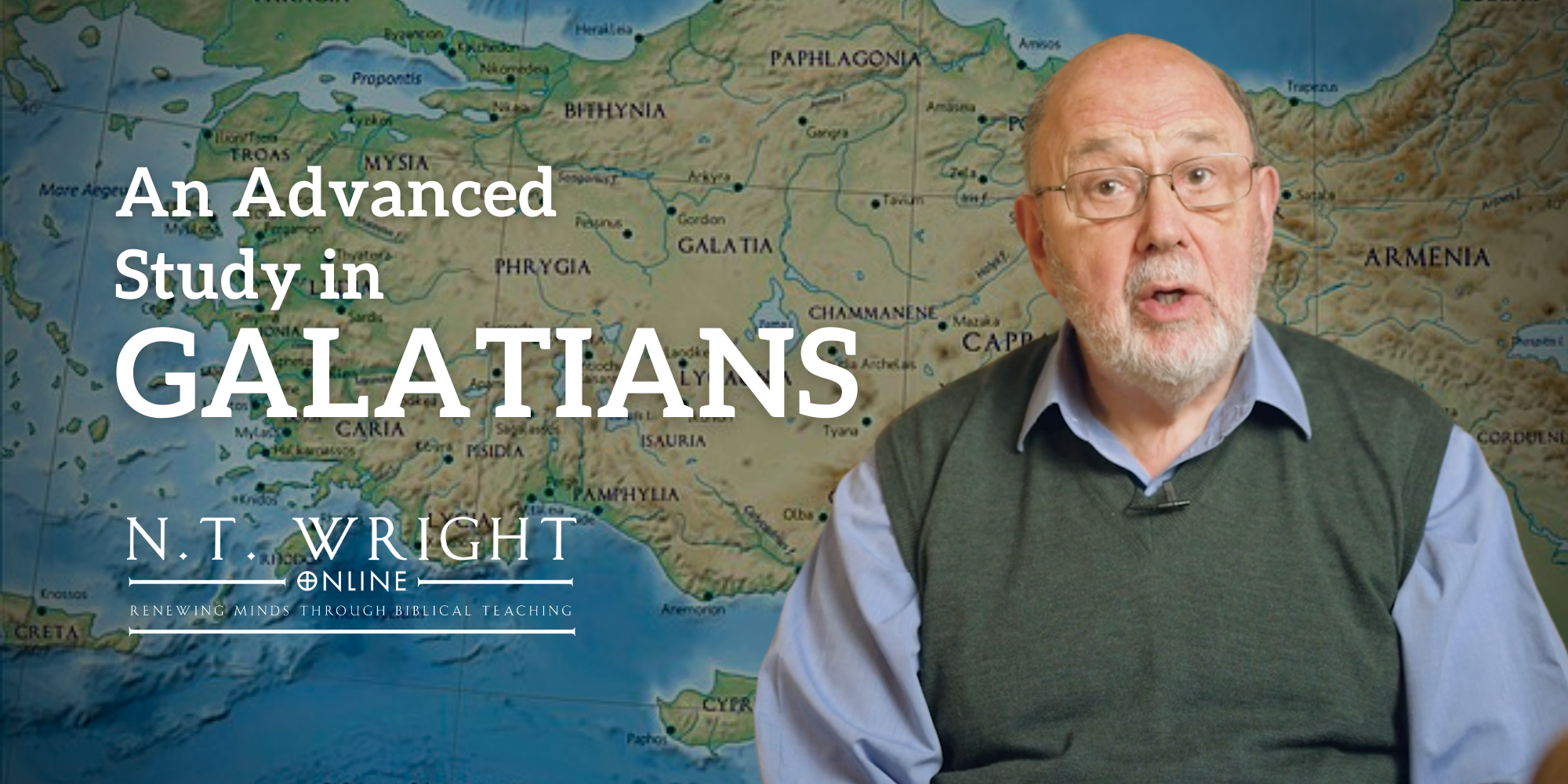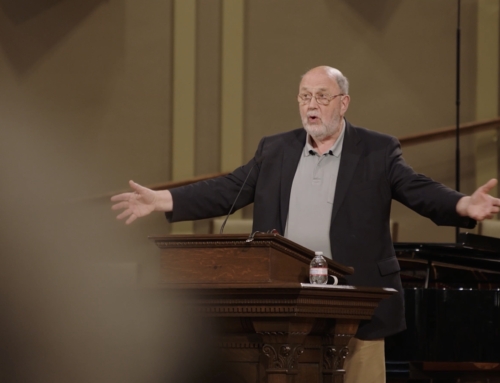An Advanced Study Study in Galatians Part 1 (1-3:18) and Part 2 (3:19-5:26) are now available!
Want to know what Prof. N.T. Wright thinks are the key concepts to understanding Paul’s letter to the Galatians? Start here!
Prof. Wright has spent a lot of time with Galatians over the past decade. That amount of time with any part of the Bible, and you’re bound to learn something new. That’s why we’re excited to release a new, two-part course on Galatians called An Advanced Study in Galatians.
Don’t be fooled. This course is definitely advanced, but only because Paul’s argument in Galatians is so masterfully constructed. It takes dedication to grasp the full reach of what Paul is saying. But we believe the Bible is for everyone, and are grateful to scholars like Prof. Wright who can break complex topics down into manageable concepts. In these two courses, Prof. Wright walks students step-by-careful-step through Paul’s claims about who belongs as part of the in-Messiah community. Here are three crucial concepts that will help orient you.
1. The Charge – People Pleasing
Paul opens Galatians by asking his readers whether he appears to them to be ‘pleasing people’. This designation, apparently, is a bad thing. Paul appears to have been accused of it, and is anxious to ward off that accusation. But what does it mean?
Prof. Wright finds the clue to this passage in a document from the ancient Jewish world called The Psalms of Solomon. (This book is now part of the Deuterocanon, which many Christians include in our Bible.) Psalms of Solomon was almost certainly a hymnbook used by the Pharisees, which means Paul would be intimately familiar with it.
This book includes a poem criticising the ‘people pleasers’, describing them as compromisers who are abandoning their loyalty to Torah for the sake of pleasing local Gentile pressures. (Prof. Wright discusses elsewhere why this disloyalty had real social and political consequences). The word would have been used often enough by zealous orthodox Jews like Saul of Tarsus before he became the Apostle Paul – and before he came to be accused of this very behaviour himself.
So Paul really wants to set out the main point up front. He is not compromising on Torah. He’s not slackening his commitment to Israel’s scriptural tradition just to get along in the society which surrounds him. His project of bringing Gentiles into Abraham’s family, in the specific way Paul recommends, is in no way out of line with God’s purposes, and Paul will employ some highly sophisticated argumentation to make this point throughout the rest of the letter.
2. The Concern – The Unity of the Church
The early community of Messiah believers was a truly odd social experiment. Paul really believed that God fulfilled God’s purposes for Israel through Jesus’ death and resurrection, but that belief wouldn’t be the most natural conclusion for everyone. Jesus’s program of Messiahship was so far out of line from what many Jews expected that anyone who came to believe in Jesus’ work had to totally recalibrate how they saw the history of God’s promises and work with Israel.
On a practical level, this new community claiming Jesus as Messiah would incur suspicion and hostility from all around. From Romans, concerned that the Gentile believers weren’t fulfilling their civic duty to worship the pagan gods. From Jews, concerned that this Roman pressure would come back to bite them. Paul saw clearly the need for the church to link arms and stand firm in their newfound purpose, lest it all crumble before even taking off. Nothing less than a new humanity had been launched. So when Paul caught wind that the Galatians were faltering in their social commitment, this was more than a practical threat. It was tantamount to saying the new humanity hadn’t been launched at all.
If Marshall McLuhan is correct that ‘the medium is the message’, then this message of a new humanity, inclusive of all Messiah believers, requires an embodied medium to display this truth tangibly – a unified community of believers.
3. The Climax – Galatians 4:21-5:1
‘Are you prepared to hear what the law says? For the Bible says that Abraham had two sons, one by the slave-girl and one by the free woman.’ Not what you were expecting, huh? Not the fruit of the spirit (Gal. 5:22-23). Not ‘neither Jew nor Greek’ (Gal. 3:28). Not even ‘I have been crucified with Christ’ (Gal. 2:19). But the Allegory of Hagar and Sarah.
After years of careful study, Prof. Wright thinks that this confusing section about two women representing two mountains, two covenants, slavery and freedom, constitutes the rhetorical climax of Paul’s whole letter. Part Two of our course An Advanced Study in Galatians explains in detail, across multiple lectures, just what this passage is all about. But what evidence suggests that this would be the climax Paul wants his readers to really pay attention to?
Remember the charge. Paul’s opponents are claiming he’s not being loyal to Israel’s traditions. Paul hasn’t forgotten, and shoots this claim right down with a fancy bit of typical Jewish exegesis, invoking in this passage allusions from each of the three traditional divisions of the Hebrew Bible—the Law, the Prophets, and the Writings. (In Hebrew, these are called the Torah, Nevi’im, and Ketuvim. Together they make up the Tanakh, an acronym for the Hebrew Bible using the first letter of each division). This is Paul flashing his very serious literary chops, proving that he’s far from compromising on Israel’s scriptural tradition. He doesn’t use this style of writing very often, so when he does, we (and his original readers) know he means business.
Want to Learn More?
Of course, this explanation only scratches the surface of what there is to understand about the dense letter to the Galatians. If you want to learn more, we encourage you to sign up for Part One of our course An Advanced Study in Galatians: Identifying the Messiah Community. It’s on sale for the launch price of just $39.99 through May 23rd. (Part Two: Ordering the Messiah Community is on sale for $29.99. Signing up gives you lifetime access to the course, so purchase both now and complete them on your own time.)
Ryan Liguori
Latest posts by Ryan Liguori (see all)
- Why Don’t the Gospels Match? - September 29, 2022
- How to Make the Most of an N.T. Wright Online Course - June 7, 2022
- Three Key Concepts from Prof. Wright’s New Course An Advanced Study in Galatians - May 19, 2022







